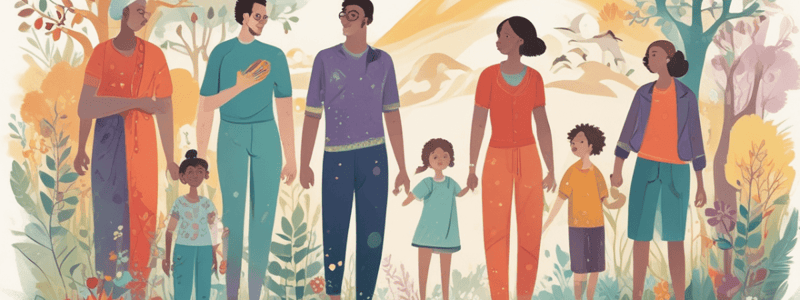Podcast
Questions and Answers
What is a strategy for maintaining a healthy relationship with a parent or guardian?
What is a strategy for maintaining a healthy relationship with a parent or guardian?
- Ignoring their advice
- Avoiding difficult conversations
- Spending quality time together (correct)
- Keeping secrets
What is an example of sibling rivalry in a family?
What is an example of sibling rivalry in a family?
- Supporting each other's hobbies
- Sharing responsibilities equally
- Planning family events together
- Arguing over chores (correct)
Which scenario represents a community relationship?
Which scenario represents a community relationship?
- Working on a solo project
- Helping a neighbor with groceries (correct)
- Arguing with a sibling
- Studying alone in the library
How can you respect diversity in your community?
How can you respect diversity in your community?
What type of communication is ideal with coworkers and supervisors?
What type of communication is ideal with coworkers and supervisors?
What skills can you learn from community service?
What skills can you learn from community service?
How do family relationships differ from other types of relationships?
How do family relationships differ from other types of relationships?
Why are relationships with grandparents valuable?
Why are relationships with grandparents valuable?
Why is it helpful to reflect on other periods of change during a difficult family adjustment?
Why is it helpful to reflect on other periods of change during a difficult family adjustment?
How is professional communication more formal than other types of communication?
How is professional communication more formal than other types of communication?
Flashcards are hidden until you start studying
Study Notes
Supporting Family and Community Relationships
Essential Question
- What can you do to promote the health of your family and community?
Family Relationships
- Family relationships are important and can be influenced by different family structures (e.g. single-parent families, foster families, stepfamilies)
- Immediate family includes close relatives such as parents, guardians, children, and siblings
- Extended family includes distant relatives such as aunts, uncles, cousins, and grandparents
- Families provide for both physical and emotional needs, including food, clothing, housing, health, and safety, as well as love, acceptance, and self-esteem
Skills for Healthy Family Relationships
- Communicate with parents or guardians about thoughts and feelings
- Strengthen relationships with parents or guardians by:
- Sharing plans ahead of time
- Discussing family rules
- Following rules and showing responsible behavior
- Remaining calm during disagreements
- Spending time doing enjoyable activities together
- Manage sibling relationships by:
- Expressing feelings to siblings
- Getting away from tense situations and cooling down
- Respecting sibling's space and privacy
- Compromising when experiencing recurring issues
- Designating personal space for each person
- Maintain relationships with grandparents by:
- Spending time with them in enjoyable ways
- Being mindful of what you share with them
- Learning a skill from them
- Offering to help with household tasks
- Staying in touch with them
Changes in the Family
- All families encounter changes over time (e.g. physical or mental health condition, loss of a job, relocation)
- These changes can create stress and disrupt family relationships
- Strategies for coping with changes include:
- Acknowledging emotions
- Reflecting on other transitions
- Working together as a family to maintain healthy relationships
Relationships in Your Community
- Community relationships are important for feeling cared for, developing a sense of belonging, and building social skills
- Community members include:
- Law enforcement
- Mentors
- Teachers
- Neighbors
- Other students
- Skills for healthy community relationships include:
- Advocating for diversity
- Communicating effectively
- Maintaining healthy boundaries
- Showing respect, demonstrating confidence, being receptive to feedback, and acknowledging others in professional communication
- Proofreading communication to avoid errors### Community Service and Relationships
- Community service can help develop skills such as critical thinking, decision-making, and professional communication.
- Reflecting on past experiences of change can help during difficult family adjustments.
Family Relationships
- Family relationships are different from other types of relationships due to emotional closeness and shared experiences.
- Grandparent relationships are valuable as they can provide emotional support and guidance.
Communication and Social Media
- Professional communication is more formal than other types of communication.
- Social media posts can influence community relationships and even affect job prospects.
- It's essential to evaluate social media accounts and consider the content's appropriateness for employers and community members.
Types of Relationships
- Friendships are reciprocal and involve give and take, requiring effort to maintain and nurture.
- Characteristics of healthy friendships include mutual trust, respect, and loyalty.
- Best friends are often people with whom you share personal experiences and feel comfortable expressing emotions.
Developing Relationships
- Developing healthy relationships takes work and requires recognizing and validating others' feelings.
- Effective communication is crucial in friendships, especially when expressing hurt or anger.
- Friendships can be developed through various experiences, such as social groups, sports, or activities.
Studying That Suits You
Use AI to generate personalized quizzes and flashcards to suit your learning preferences.




